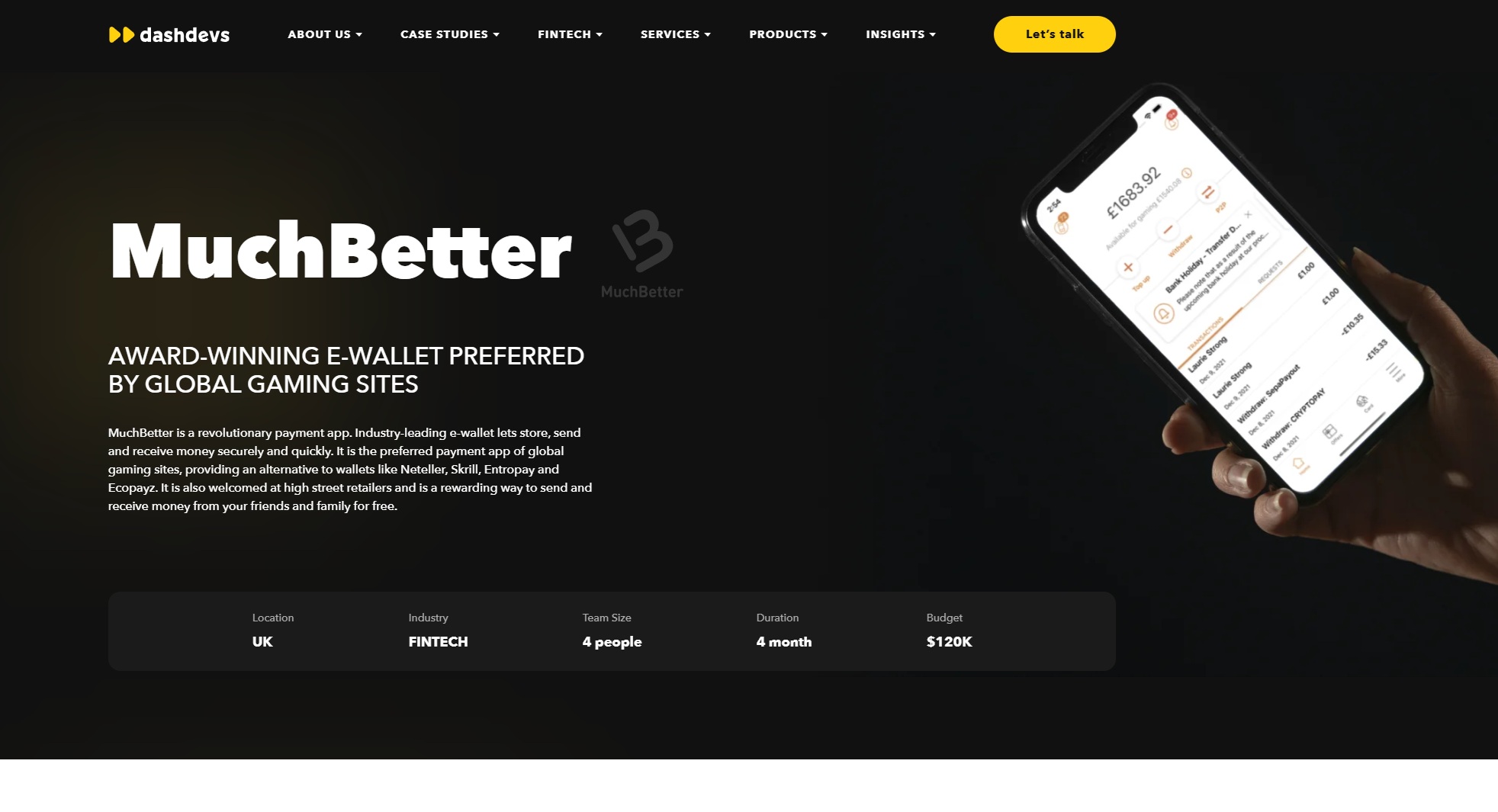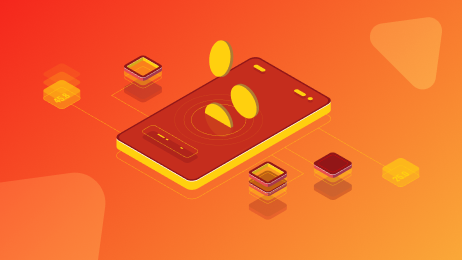APRIL 2, 2025
14 min read
With a high penetration rate of 49% and bringing more than half of the total value of online payments worldwide, digital wallets are becoming a dominant method of payment. Basically, it means that not having a digital wallet may lead to losing about half of potential payments or having customer experience worsened for approximately the same percentage of customers.
In this post, you’ll discover digital wallet technicalities. You’ll also explore the value-adding benefits its development and adoption can potentially bring to your business. Besides, you will find out about 15 different types of digital wallets and review their specificities, tasks they fulfill, and world-famous examples of such wallets.
What Is a Digital Wallet?
A digital wallet is a software-based system that securely stores users’ payment information and passwords for numerous payment methods and websites.
By using a digital wallet, users can:
- Make online purchases
- Pay for in-store purchases
- Store loyalty and rewards cards
- Store boarding passes and event tickets
- Send and receive money
- Access ATMs
- Pay bills
- Track spending and manage finances
- Store digital IDs and documents
- Make contactless payments
Digital wallets can be used in conjunction with mobile payment systems, which allow customers to pay for purchases with their smartphones.
An example of such a conjunction is Google Wallet, one of the most popular digital wallets, which can be used in tandem with Google Pay to conduct contactless payments and utilize Tap to Pay features.
From the technical perspective, digital wallets can be:
- Standalone software solutions based on mobile, desktop, or web platform
- A distinct functionality within another app or a website
Basically, just like your real wallet holds your cash, credit cards, and IDs, a digital wallet stores all of that information electronically on your smartphone or computer. WIth it, you can, for example, simply use your phone or device to make a payment quickly and securely instead of pulling out a card or cash to pay.
Looking for expert e-wallet app development services? Reach out to DashDevs with your project idea, and let’s discuss it.
Value-Adding Benefits of Having a Digital Wallet
A digital wallet can be quite a lucrative development project idea. Let’s now review the essential benefits of creating and using a digital wallet in your business as a main offering or as a complementary service:
- Additional revenue streams. Generate new income through transaction fees, subscriptions, or added services like insurance.
- Cross-selling. Use the digital wallet to promote related products and services, enhancing sales opportunities.
- Better customer experience. Accept payments with a digital wallet, improving convenience and customer satisfaction.
- Greater financial inclusion. Reach underserved populations, providing them with essential financial tools.
- Opportunity to create loyalty and rewards programs. Integrate loyalty and rewards programs to encourage repeat business and customer loyalty.
- Stronger competitiveness. Stand out from competitors by meeting consumer demand for digital payment solutions.
The list of businesses that can benefit from having a digital wallet as a distinct app or as a part of their main software product is shown in the infographic below:

By now, you have a list of concrete advantages that having a digital wallet can bring and a number of businesses that can reap the most benefits of this promising opportunity.
But the crucial question here is: “How can I convert an idea to a project?”
Well, you should start by examining digital wallet types, classifications, functionalities, and real-life examples that are already there. This way, you’ll be able to identify exactly the wallet your business needs to offer as a standalone product or as an addition to your main offering.
It’s safe to claim that such a software product as a digital wallet will always have numerous specificities, making them hard to categorize. However, DashDevs experience shows that there are, as of now, 15 digital wallet types, which we can distribute into six categories.
Take a look at the webinar of DashDevs CEO — Igor Tomych, on the topic of how to build digital wallets.
Digital Wallets By Storage Type
Let’s get started with reviewing a list of e-wallets differentiated by their storage type:

#1 Centralized Wallet
A centralized wallet is an electronic wallet that is managed and controlled by a single institution, such as a bank or financial company. This form of wallet stores users’ money and private data on central servers, offering a traditional approach of managing digital assets.
Distinctive features of centralized wallets:
- Secure storage of funds and personal information
- Ability to send and receive mobile purchases
- Transaction history tracking
- User authentication and authorization
- Integration with banking and financial services
Examples of centralized wallets:
- PayPal
- Venmo
- Apple Pay
Best for:
- Traditional fintech apps
- Neobanks or e-wallet services
- Retail platforms needing regulated payment infrastructure
#2 Decentralized Wallet (DeFi)
A decentralized wallet, also known as decentralized finance (DeFi), is a sort of digital wallet examples that operates on the blockchain network. This approach gives consumers total control over their cash, eliminating the need for a centralized supervisor.
Distinctive features of decentralized wallets:
- Self-custody of assets
- Direct peer-to-peer transactions
- Integration with DeFi platforms and services
- Support for multiple cryptocurrencies
- Enhanced privacy and security
Examples of decentralized wallets:
- MetaMask
- Trust Wallet
Best for:
- DeFi startups and Web3 projects
- Crypto-native apps and DAOs
- Projects emphasizing user autonomy and privacy
- Platforms targeting early crypto adopters and enthusiasts
Since a digital wallet is a payment method, it’s involved in the full payment processing flow. Discover more about how to build a payment gateway, one of the integral components of transaction processing.
Digital Wallets By Usage Form
Digital wallets also can vary based on what parties utilize such wallets, as it largely impacts the functionality needed:

#3 Merchant Wallet
A merchant wallet is a sort of digital wallet designed specifically for shops and merchants to accept digital payments. Such types of wallet account simplifies transactions between companies and customers by often integrating with point-of-sale (POS) systems and e-commerce platforms.
Distinctive features of merchant wallets:
- Acceptance of various payment methods (credit/debit cards, digital currencies)
- Integration with POS systems and e-commerce platforms
- Instant payment processing
- Sales and transaction tracking
- Refund and chargeback management
Examples of merchant wallets:
- Square Wallet
- Shopify Payments
- Stripe Terminal
Best for:
- E-commerce platforms and online retailers
- Local and global POS-based businesses
- Food delivery, ride-hailing, and service platforms
- Projects needing real-time payment acceptance
#4 Retail Bank Wallet
A retail bank wallet is a digital wallet provided by traditional banks to their customers. It enables users to conduct various banking transactions digitally, such as transferring money, paying bills, and managing accounts.
Distinctive features of retail bank wallets:
- Money transfers and bill payments
- Account balance and transaction history
- Mobile device check deposit
- ATM locator
- Integration with bank’s other services
Examples of retail bank wallets:
- Chase Mobile
- Bank of America Mobile Banking
- Wells Fargo Mobile
Best for:
- Traditional banks entering the digital space
- Challenger banks or credit unions
- Financial institutions digitizing retail services
- Projects with a full-service banking backend
#5 B2B Wallet
A B2B (business-to-business) wallet is a digital wallet designed to facilitate commercial transactions. It simplifies the payment process in B2B transactions by providing features such as bulk payments, invoicing, and payment tracking.
Distinctive features of B2B wallets:
- Bulk payment processing
- Invoicing and payment tracking
- Integration with accounting software
- Multi-user access for team management
- Secure fund transfers between businesses
Examples of B2B wallets:
- PayPal Business
- Veem
- Payoneer
Best for:
- SaaS billing platforms
- Enterprise fintech solutions
- Freelance, contractor, and vendor payment services
- Projects focused on simplifying large-scale or recurring B2B transactions
Digital Wallets by Currency Availability
Since currencies supported can be a predominating factor in choosing a particular wallet, categorization by currency availability should also take place. Let’s review this list of e-wallets, distinguished by currency availability as well:

#6 Single Currency Wallet
A single currency wallet is a digital wallet that only accepts one sort of currency, whether it fiat or cryptocurrency. It is intended for users who do most of their transactions in a single currency.
Distinctive features of single currency wallets:
- Storage and management of a single currency
- Sending and receiving payments in that currency
- Transaction history tracking
- Secure storage of funds
- User-friendly interface for easy transactions
Examples of single currency wallets:
- Bitcoin Wallet
- MyEtherWallet
- Cash App
Best for:
- Niche financial apps (e.g., Bitcoin-only or EUR-only apps)
- Projects with a single-market focus
- Services needing simple, focused wallet infrastructure
- Apps targeting beginner-level users
#7 Multicurrency Wallet
A multicurrency wallet is a digital wallet that accepts various currencies, including fiat and cryptocurrencies. It enables users to maintain and transact in several currencies through a single platform.
Distinctive features of multicurrency wallets:
- Support for multiple currencies
- Easy switching between currencies
- Secure storage of funds for each currency
- Sending and receiving payments in different currencies
- Consolidated transaction history
Examples of multicurrency wallets:
- Revolut
- Coinomi
- Atomic Wallet
Best for:
- Cross-border payment platforms
- Crypto exchanges and hybrid wallets
- Travel finance and expat services
- Projects targeting global or multi-market audiences
Digital Wallets By Digital Ecosystem Restrictions

In some cases, providers of digital wallet services opt to restrict the number of parties that can use them, which conceived another category of wallets:
#8 Open Wallet
An open wallet is a digital wallet that enables users to make transactions outside of the issuing platform, such as withdrawals to bank accounts and transfers to other wallets.
Distinctive features of open wallets:
- Withdrawal of funds to bank accounts
- Transfer of funds to other wallets
- Payment for goods and services
- Receiving payments from various sources
- Integration with financial services
Examples of open wallets:
- Paytm
- MobiKwik
- PhonePe
Best for:
- Super apps and multi-service platforms
- Financial platforms offering remittance, payouts, and withdrawals
- Projects focused on user convenience and financial flexibility
- E-wallets competing with traditional banking
#9 Closed Wallet
A closed wallet is a digital wallet that only allows transactions with the issuing platform or a single merchant. Users can only utilize their monies within the service provider’s environment.
Distinctive features of closed wallets:
- Payment for goods and services within the platform
- Refunds and cashbacks storage
- Loyalty points and rewards management
- Secure storage of funds within the platform
- User-friendly interface for transactions within the ecosystem
Examples of closed wallets:
- Amazon Pay
- Starbucks Wallet
- Walmart Pay
Best for:
- E-commerce giants and single-brand ecosystems
- Loyalty/rewards-based platforms
- Subscription-based services
- Projects optimizing internal transactions and reducing external fees
Digital Wallets by Device Platform

As of now, there are three main software platforms, mobile, desktop, and cross-platform. Digital wallets are categorized by this factor as well:
#10 Mobile Platform Wallet
A mobile wallet is a digital wallet that is designed for use on mobile devices like smartphones and tablets. Mobile wallets allow users to manage their funds and make transactions on the go.
Distinctive features of mobile platform wallets:
- Touchscreen interface optimized for mobile device use
- QR code scanning for payments
- Near Field Communication NFC for contactless payments
- Integration with mobile banking and payment apps
- Biometric security features (fingerprint, facial recognition)
Examples of mobile platform wallets:
- Apple Pay
- Google Pay
- Samsung Pay
Best for:
- On-the-go payment solutions
- QR code-based and NFC-driven apps
- Consumer apps targeting mobile-first users
- Projects needing fast market entry and accessibility
#11 Desktop Platform Wallet
A desktop platform wallet is a digital wallet application that may be used on desktop or laptop computers. It provides a standard computer-based interface for managing digital assets and credit card transactions.
Distinctive features of desktop platform wallets:
- Comprehensive user interface for detailed asset management
- Integration with desktop applications and software
- Enhanced security features like encryption and two-factor authentication
- Backup and restore options for wallet data
- Support for various cryptocurrencies and fiat currencies
Examples of desktop platform wallets:
- Electrum
- MetaMask (browser extension)
Best for:
- Crypto traders and power users
- Finance tools with advanced analytics
- Apps requiring high security and desktop integrations
- Projects aimed at experienced asset managers
#12 Cross-Platform Wallet
A cross-platform wallet is a digital wallet that works with a variety of operating systems and devices, giving consumers a consistent experience across their smartphones, tablets, and laptops.
Distinctive features of cross-platform wallets:
- Synchronization of wallet data across devices
- Uniform user experience on different platforms
- Secure access to funds from any device
- Backup and recovery options across platforms
- Support for a wide range of currencies and assets
Examples of cross-platform wallets:
- Jaxx Liberty
- Trust Wallet
Best for:
- Wallets targeting tech-savvy, multi-device users
- Fintech solutions offering flexibility across ecosystems
- Crypto and finance apps with high user retention focus
- Projects aiming for broad accessibility
Interested to discover how to create a digital wallet? Explore another blog post by DashDevs.
Other Digital Wallet Types

Finally, there are several digital wallet types that don’t quite fit any other category and constitute all other types of wallets:
#13 Crypto Currency Wallet
A cryptocurrency wallet is a digital wallet program that is particularly built for storing, managing, and transacting bitcoin. It enables users to securely store their private keys, which are required for accessing and transacting their digital assets.
Distinctive features of crypto currency wallets:
- Secure storage of private keys
- Sending and receiving cryptocurrencies
- Viewing transaction history
- Support for multiple cryptocurrencies (in some wallets)
- Integration with blockchain networks
Examples of crypto currency wallets:
- Coinbase Wallet
- Blockchain Wallet
- Exodus Wallet
Best for:
- Blockchain projects and crypto platforms
- NFT marketplaces and dApps
- Exchanges and crypto-enabled services
- Projects requiring secure crypto asset management
#14 Currency Exchange Wallet
A currency exchange wallet is among e-wallet types developed exclusively for exchanging multiple currencies, including fiat and cryptocurrency. It enables the purchase, sale, and trading of currencies on a secure platform.
Distinctive features of currency exchange wallets:
- Real-time currency exchange rates
- Support for multiple fiat and cryptocurrencies
- Secure storage of funds during the exchange process
- Integration with currency exchange services
- Transaction history and reporting tools
Examples of currency exchange wallets:
- Wise
- CurrencyFair
- Kraken
Best for:
- Global remittance and FX services
- Platforms offering trading or conversions
- Travel money apps
- Projects targeting multi-currency transactions with real-time rates
#15 Prepaid Cards Wallet
Prepaid card wallets are digital wallets that allow users to store and manage prepaid debit and gift cards. It allows you to easily access and utilize prepaid funds for a variety of transactions.
Distinctive features of prepaid cards wallets:
- Storage and management of multiple prepaid cards
- Balance checking and transaction history for each card
- Secure PIN and card information storage
- Easy top-up and reload options
- Integration with payment networks and retailers
Examples of prepaid cards wallets:
- Gyft
- NetSpend (prepaid debit card management)
Best for:
- Gig economy platforms and payroll services
- Gift card platforms
- Fintechs targeting unbanked or underbanked users
- Projects enabling controlled spending or card-based loyalty programs
By developing and incorporating a digital wallet app into your business, whether as a standalone product or as a feature of your main software solution, you can gain a notable business advantage over competitors.
Let’s summarize this list of e-wallets in one simple table:
| Wallet Type | Category | Best For |
|---|---|---|
| #1 Centralized Wallet | By Storage Type | Traditional fintech apps, neobanks, retail platforms |
| #2 Decentralized Wallet | By Storage Type | DeFi apps, Web3 projects, DAOs |
| #3 Merchant Wallet | By Usage Form | E-commerce, POS-based businesses, delivery and service platforms |
| #4 Retail Bank Wallet | By Usage Form | Banks, credit unions, full-service financial platforms |
| #5 B2B Wallet | By Usage Form | SaaS billing, enterprise fintech, freelance/vendor payments |
| #6 Single Currency Wallet | By Currency Availability | Bitcoin-only apps, single-market services, beginner-friendly apps |
| #7 Multicurrency Wallet | By Currency Availability | Cross-border payments, crypto exchanges, travel finance |
| #8 Open Wallet | By Ecosystem Restrictions | Super apps, remittance platforms, banking alternatives |
| #9 Closed Wallet | By Ecosystem Restrictions | E-commerce brands, loyalty apps, subscription-based platforms |
| #10 Mobile Platform Wallet | By Device Platform | NFC apps, QR-based payments, mobile-first projects |
| #11 Desktop Platform Wallet | By Device Platform | Traders, desktop finance tools, secure asset management |
| #12 Cross-Platform Wallet | By Device Platform | Multi-device users, fintech ecosystems, crypto apps |
| #13 Cryptocurrency Wallet | Other | Blockchain platforms, NFT/dApp users, crypto asset storage |
| #14 Currency Exchange Wallet | Other | FX services, global remittance, trading platforms |
| #15 Prepaid Cards Wallet | Other | Gig economy, payroll, gift cards, underbanked user apps |
Expertise Needed to Create a Digital Wallet
It’s worth mentioning that custom development of a digital wallet requires substantial fintech knowledge and expertise. After all, being quite an intricate software solution already, digital wallets vary greatly in their specificities.
Here’s a basic scope of expertise needed to kickstart the development of a digital wallet:
- Web development
- Mobile app development
- Cybersecurity
- Payment integration
- UI/UX
Besides, what’s even more crucial is regulatory compliance. Since examples of digital wallets are basically fintech solutions that deal with the personal sensitive information of customers and their billing data as well as funds, standards regulating the operation of digital wallets are strict.
Aside from local regulations, compliance with these international standards is a must:
- PCI-DSS (Payment Card Industry Data Security Standard)
- GDPR (General Data Protection Regulation)
- PSD3 (Revised Payment Services Directive)
- AML (Anti-Money Laundering) and KYC (Know Your Customer) Regulations
- CPS (Cryptographic Protection Standards)
You may discover about intricacies of fintech and security compliance in MENA in another blog post by DashDevs.
How to Get Started with a Digital Wallet Development
It’s worth mentioning that custom development of a digital wallet requires substantial fintech knowledge and expertise. That’s why there’s no simple answer to the question of how to actually get your e wallet app up and running. However, I can still offer you a recommendation.
Pro tip: In case you don’t have a specialized in-house dev team or just lack development resources and don’t want to distract from your main business, consider partnering with an outsourcing development firm.
Here at DashDevs, we have more than 12 years of experience in the fintech software development market. With 500 projects successfully delivered, 80 of which are fintech, we are ready, willing, and able to take on bring your wallet idea to life.

As proof of our proficiency in creating digital wallets, take a look at our success story — the development of MuchBetter, an e-wallet payment app. In only 4 months, our team delivered a fully-fledged wallet solution intended for the UK market, providing an alternative to wallets like Neteller, Skrill, Entropay, and Ecopayz
Final Take
Digital wallet apps are revolutionizing the way businesses operate, providing a seamless, secure, and convenient payment solution. With 15 types of digital wallets catering to various business objectives and targeting customers’ needs, businesses can enhance customer experience, improve financial inclusion, and stay competitive in the digital age.
Partnering with a trusted team specializing in fintech development is half the battle. Consider DashDevs your primary choice of tech provider for your digital wallet project. We can help you launch your custom wallet within the shortest possible terms, starting from 1 month, and with the best outcomes for your business.









